Mike Pence takes lead role in campaign with Donald Trump travel stopped
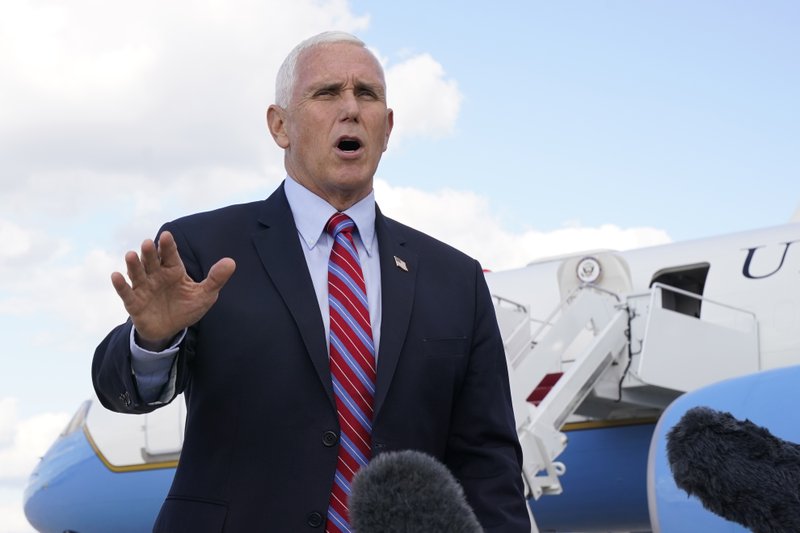
“I spoke to the president a little while back. He sounded great,” Pence told reporters at Joint Base Andrews before heading west to Utah for this week’s vice presidential debate.
Donald Trump looking to Sarah Huckabee Sanders in tough moments
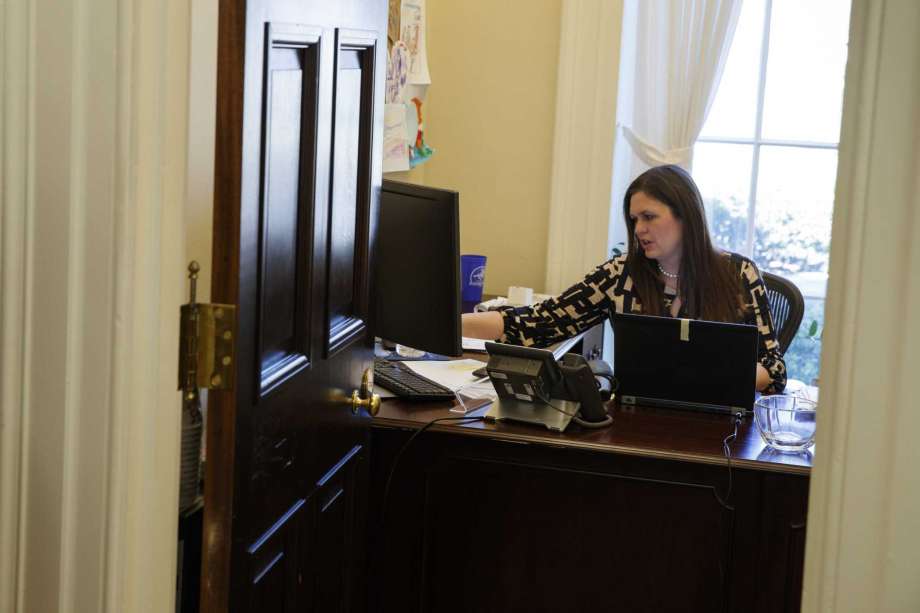
Faced with aggressive on-air questioning about the president’s wiretapping claims, Sarah Huckabee Sanders didn’t flinch, she went folksy. Speaking to George Stephanopoulos on “Good Morning America,” she pulled out a version of an old line from President Lyndon Johnson: “If the president walked across the Potomac, the media would be reporting that he could not swim.” The 34-year-old spokeswoman for President Donald Trump was schooled in hardscrabble politics — and down-home rhetoric — from a young age by her father, former Arkansas Gov. Mike Huckabee. Her way with a zinger — and her unshakable loyalty to an often unpredictable boss — are big reasons why the deputy press secretary is a rising star in Trump’s orbit. In recent weeks, Sanders has taken on a notably more prominent role in selling Trump’s agenda, including on television and at White House press briefings. As White House press secretary Sean Spicer’s public profile has fluctuated in recent weeks amid criticism of his performance, Sanders has increasingly become a chief defender of Trump in some of his toughest moments. Sanders’ rise has fueled speculation that she’s becoming the president’s favored articulator, a notion she disputes. “It’s hard for any one person to maintain a schedule of being the singular face all day every day,” she said. She argued that more than one press aide spoke for President Barack Obama. “When Eric Schultz went on TV did anybody say Josh Earnest is getting fired?” Sanders asked. “Was that story ever written?” Spicer echoed that message: “My goal is to use other key folks in the administration and the White House to do the shows.” Indeed, speaking on behalf of this president is a challenging and consuming job. Trump often presents his own thoughts directly on Twitter in the early hours of the morning and is known to closely follow his surrogates on television, assessing their performances. He has been happy with Sanders’ advocacy, said Kellyanne Conway, a counselor to the president. “She understands America. She understands the president. And she understands how to connect the two,” said Conway, who noted that Sanders had appeared on television throughout the campaign as well. “The president has a great deal of trust in Sarah.” On some days recently Sanders has been the administration’s messenger of choice, even when news outlets aren’t thrilled. Last Sunday, NBC’s Chuck Todd said on-air that “Meet the Press” had sought a “senior administration official or a Cabinet secretary,” but that the “White House offered a deputy press secretary. And so we declined.” Sanders credits her larger-than-life dad with helping her learn how to deliver a message. Huckabee, a frequent political commentator, has long been famed for his pithy rhetoric. The two speak most mornings before 6 a.m. “I’ll call and say, ‘What do you think if I say this?’ He’ll say, ‘That’s really good. You might try to say it a little bit more like X,’” she said. On advocating for the unconventional Trump, Sanders admits that even in the press office, they don’t always get a heads up before Trump tweets. But she says part of Trump’s appeal is that he “directly communicates with the American people on a regular basis.” Arkansas-raised, Sanders moved her young family to Washington to be part of the administration. She is married to a Republican consultant and they have three young children. She joined the Trump campaign not long after her father’s second presidential bid — which she managed — fizzled out in the 2016 Iowa caucuses. She said she was drawn to Trump’s message of economic populism and his outsider attitude. “One of the big things my dad was running on was changing Washington, breaking that cycle,” Sanders said. “I felt like the outsider component was important and I thought he had the ability to actually win and defeat Hillary.” She also said she was drawn to the Trump family’s close involvement in the campaign, “having kind of been in the same scenario for my dad’s campaign.” Being part of an effort to defeat Hillary Clinton had extra significance for Sanders, whose father entered the Arkansas governor’s mansion just a few years after Bill Clinton exited and who shared advisers and friends in the state. Sanders said at times it was difficult to be aggressive, but she “so disagreed” with Hillary Clinton’s policies, that she kept on. Sanders entered politics young, helping with her father’s campaigns as a child and then working her way up the ranks until she had the top job in 2016. In 2007, she moved to Iowa to run her father’s operation in the leadoff caucus state, where he was the surprise winner. She has also served in the Education Department under President George W. Bush and worked on a number of Senate and presidential campaigns. Mike Huckabee said his daughter was always a natural. “When most kids at 7 or 8 are jumping rope, she’s sitting at the kitchen table listening to Dick Morris doing cross tabs on statewide polls,” said Huckabee, referring to the adviser-turned-adversary to President Bill Clinton. Those Arkansas ties continue to hold strong. Sanders has consulted with friends from the state about her new role, including Mack McLarty, the former Clinton chief of staff, who she said counseled her to appreciate the “historic opportunity” to work in the White House. Her rising profile has come with ups and downs. Sanders says she is turning off social media alerts because she has been flooded with criticism. For now, she has not been treated to a portrayal on “Saturday Night Live” — like Spicer and Conway. But her dad says that if that comes next, she should roll with it. “One of the great honors of life is to be parodied,” Huckabee said. “It’s kind of an indication that you’ve arrived at a place of real power.” Republished with permission of The Associated Press.
About that unusually tense interview between Stephanopoulos, Trump aide
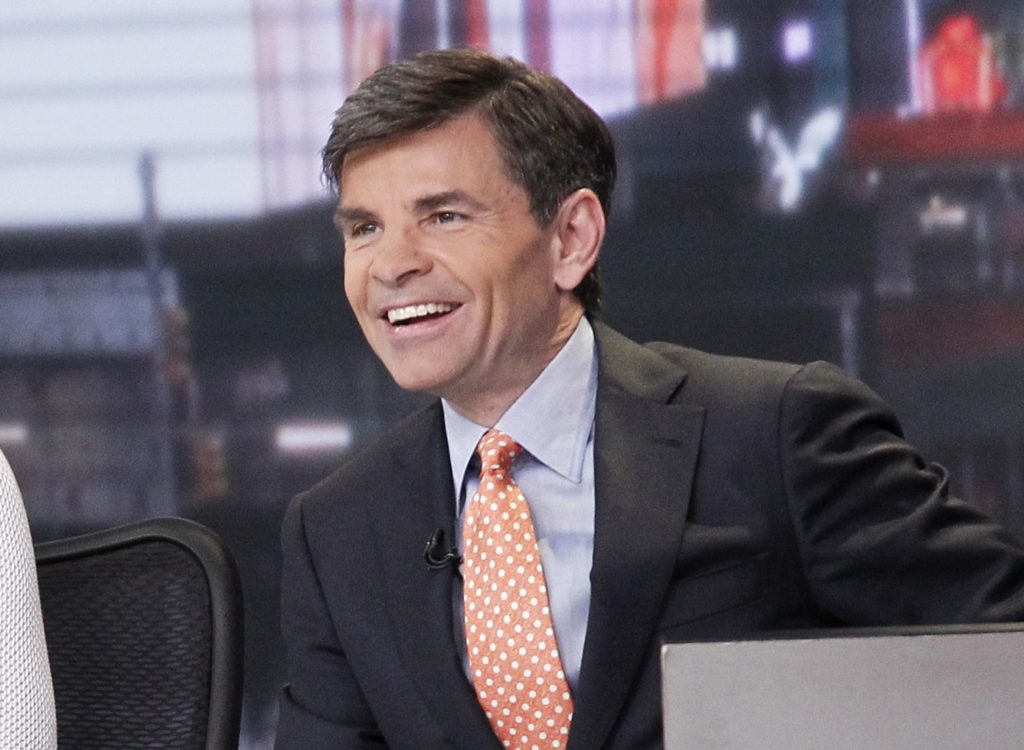
George Stephanopoulos‘ “Good Morning America” interview with White House spokeswoman Sarah Huckabee Sanders on Monday is an instant milestone in the hostile relationship between the Trump administration and the media. In the discussion about President Donald Trump‘s weekend accusations — offered without proof — that former President Obama ordered Trump’s New York home wiretapped, Stephanopoulos repeatedly interrupted and stopped Sanders when he felt she veered from the truth. It was a crackling exchange unusual for the generally happy terrain of network morning television, and made Stephanopoulos a hero or villain depending on whose social media feed is followed. It was also the second time in a month that the ABC anchor had a notably sharp interview with a Trump administration official. On “This Week” last month, he repeatedly pressed Trump aide Stephen Miller for evidence to back up the claim that there was massive voter fraud in the election. Sanders was also interviewed on NBC’s “Today” show on Monday, while “CBS This Morning” turned down the White House’s offer to have her on. Fox News Channel’s “Fox & Friends” brought presidential counselor Kellyanne Conway on to speak about Trump’s allegations, less than a day after White House press secretary Sean Spicer said there would be no further comment on the issue. It wasn’t clear what changed the administration’s strategy. Stephanopoulos began his interview by asking Sanders whether Trump accepted reports that FBI director James Comey had denied there was any wiretapping of Trump. Sanders said she didn’t believe he did, and started talking about wiretapping reports in other media outlets. “Sarah, I have got to stop you right there,” Stephanopoulos said. The stories she cited did not back up the president’s claims, he said. “What is the president’s evidence?” he asked. Sanders said there was “wide reporting” suggesting that the administration could have ordered wiretapping. Stephanopoulos stopped her to note there was a report of a court-ordered wiretapping, although James Clapper, former director of national intelligence under Obama, had denied that. Stephanopoulos stopped Sanders again when she noted that the unsubstantiated report of a wiretapping order came under the Obama administration and that “all we’re asking is that Congress be allowed to do its job.” “Hold on a second,” he said. “There is a world of difference between a wiretap ordered by a president and a court-ordered wiretap by a federal judge.” Noting that Obama’s representatives, Comey and Clapper had all said there was no wiretapping, Stephanopoulos asked, “is the president calling all three of these people liars?” Sanders said that he wasn’t, but that it was a matter for congressional investigators to look into. She said she considered it a double standard that the media does not believe Trump when he says nothing untoward had happened between him and Russia, while reporters accept denials by the Obama administration on the wiretap accusation. “If the president walked across the Potomac, the media would be reporting that he could not swim,” she said. The interview illustrated the difficulties the media faces in trying to report on the president’s unsubstantiated tweets. There was a furious debate on the “Good Morning America” Facebook page on Monday afternoon between people who cheered the host, a one-time adviser to President Bill Clinton, for calling out untruths, and others who believed he was rude — even suggesting they would boycott ABC’s morning show because they were disgusted by the interview. Many of Trump’s supporters are angered by aggressive questioning because they believe the media did not ask similar tough questions of the Obama administration, said Tim Graham of the Media Research Center, a conservative media watchdog. “You have no right to tell us what the truth is,” Graham said. At the same time, reporters face pressure from Trump opponents who give no quarter, as witnessed by last week’s backlash against television analysts who suggested Trump gave an effective speech before Congress. There are also some who believe the wiretap accusation itself is a way to distract people from the story about Russia, and the media effectively supports the strategy by reporting it. Stephanopoulos said after the interview that his job is to elicit as much clarity as possible, and he believed his interview was an important opportunity to get the Trump administration on the record on these issues. “If I hear something that I know to be untrue, then I think it’s my responsibility to point that out,” he said. Sanders’ interview on “Today” was more peaceful, but still had some tense moments. Savannah Guthrie interrupted Sanders to ask a second time when she wouldn’t answer her question about whether the president had made his accusations solely after seeing media reports. She said she didn’t know. Sanders later repeated the same line about the Potomac River. Conway was given more time to talk on “Fox & Friends,” although she did face pushback on whether Trump associates who had conversations with Russian officials had hurt the president. She drew laughs when she said she wished she had $50 for every time Russia was mentioned in the news. “A drinking game,” one of the Fox anchors joked off-screen. Republished with permission of The Associated Press.
Donald Trump auditions Cabinet prospects high above Manhattan

Donald Trump held court from his perch high above Manhattan on Monday, receiving a line of former rivals, longtime allies and TV executives while overseeing a presidential transition that at times resembles a reality show like the one he once hosted. Trump met with nearly a dozen prospective hires, all of whom were paraded in front of the cameras set up in the Trump Tower lobby as they entered an elevator to see the president-elect. Out of public view himself, he fell back on his TV star roots by filming a video that touted his legislative goals once he takes office. Trump; did not immediately announce any appointments after the meetings, which came on the heels of a two-day whirlwind of interviews at his golf course in Bedminster, New Jersey. Unlike his predecessors, who often spoke with Cabinet candidates under a cloud of secrecy, Trump has turned the search into a very public audition process. The extraordinary exercise took on a routine feel on Monday: First, former Massachusetts Senator Scott Brown stepped off the gold-plated elevator into the marble-coated lobby after his meeting to declare to waiting reporters that he was “the best person” to become Veterans Affairs secretary. Next, Oklahoma Gov. Mary Fallin, a candidate for interior secretary, did much the same, striding off the lift to say she had “a wonderful discussion” with Trump. Former Texas Governor Rick Perry declined to speak to reporters, but he did take time for a photo with the Naked Cowboy, the underwear-sporting, guitar-strumming New York institution who is normally a fixture at Times Square but has spent recent days camped out at Trump Tower singing about the president-elect. Democratic Hawaii Rep. Tulsi Gabbard, who resigned her post on the Democratic National Committee after endorsing Bernie Sanders over Hillary Clinton, also met with Trump but entered and exited out of sight. She later defended crossing party lines to meet with Trump about U.S. involvement in Syria, saying in a statement she would never “play politics with American and Syrian lives.” Former House Speaker Newt Gingrich, a longtime Trump ally, also arrived with his wife, Callista, and told reporters that he indicated to Trump that he was interested in being a “senior planner” to coordinate long-term political efforts among the Republicans in control of all three branches of government. Senior adviser Kellyanne Conway said of the visitors, “Not all of them will be in his Cabinet and his federal government, but they are all incredibly important in offering their points of views, their experience and certainly their vision of the country.” No one was saying whether Trump would announce more appointments before heading to Florida for Thanksgiving. He was planning to leave Tuesday or Wednesday to spend the holiday at his Mar-a-Lago estate, while Vice President-elect Mike Pence will spend Thanksgiving in Mississippi, where his Marine son is stationed. Trump has largely remained out of sight since winning the election, save for a flurry of brief public appearances over the weekend, often with Pence at his side, to flash thumbs-ups and provide quick updates on his progress in building a government. He remained in the upper floors of his skyscraper Monday, seeking counsel on the phone and interviewing candidates all while keeping an eye on the cable news coverage of the day’s events. He appeared in a two-and-a-half minute video released late Monday in which he pledged to the American people that he was appointing “patriots” to his administration and reiterated a number of his campaign promises, including plans to renegotiate trade deals, scrap excessive regulations and institute a five-year ban on executive officials becoming lobbyists. The video — which made no mention of key pledges to build a border wall with Mexico or repeal the Affordable Care Act — continues the president-elect’s practice of trying to go over the heads of the media and take his case directly to the American public. Since Election Day, he has twice ditched the group of reporters designated to follow his movements and has so far eschewed the traditional news conference held by the president-elect in the days after winning. Trump has not held a full-fledged news conference since July. But the media were clearly on his mind as he met with executives and on-air personalities from TV networks. He frequently singled out the media — declaring them “so dishonest” — for criticism during the campaign, but it’s not unusual for presidents to hold off-the-record meetings with journalists when trying to promote policies or programs. Among the attendees were NBC anchor Lester Holt and “Meet the Press” host Chuck Todd, ABC’s “Good Morning America” host George Stephanopoulos and anchor David Muir, CBS’ “Face the Nation” host John Dickerson, CNN’s Wolf Blitzer and several executives at the networks. None of the attendees would discuss the meeting with reporters in the lobby, though Conway said it was “very cordial, very productive, very congenial.” Those Trump met with over the weekend included former Massachusetts Gov. Mitt Romney, a former critic now being considered for secretary of state; retired Marine Corps Gen. James Mattis, who Trump dubbed an “impressive” prospect for defense secretary, and billionaire investor Wilbur Ross, who is under consideration for Commerce secretary. “We’ve made a couple of deals,” Trump said Sunday. He gave assurances that “incredible meetings” would be bringing “incredible people” into the government. Republished with permission of the Associated Press.
Donald Trump says he saw people celebrating 9/11 in Jersey City
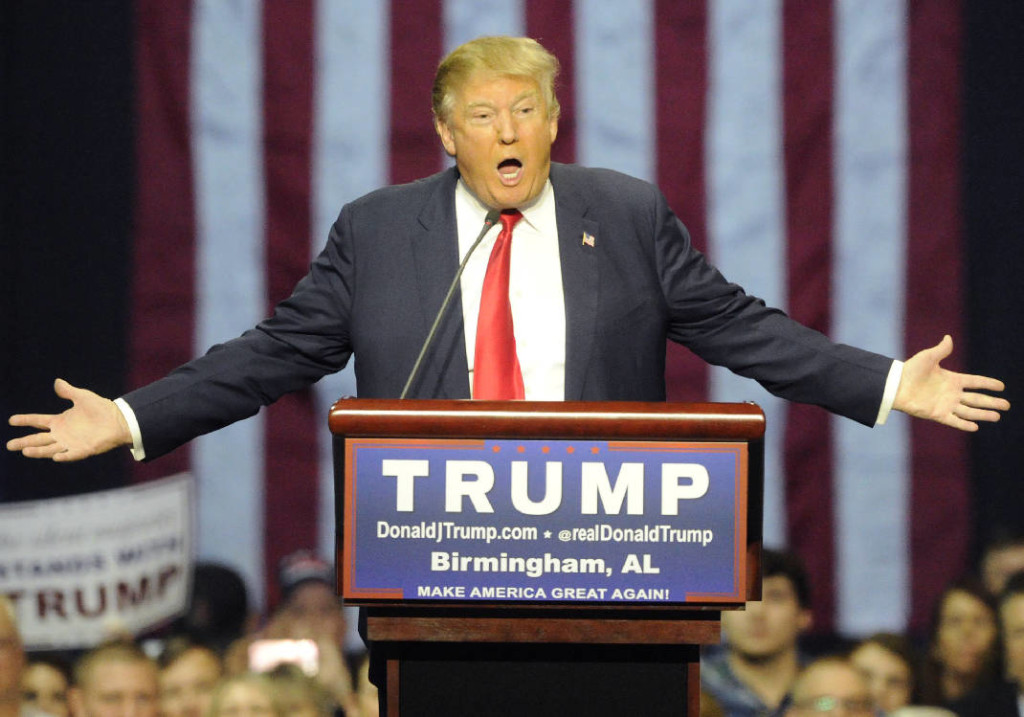
Republican presidential candidate Donald Trump says he saw people cheering the Sept. 11 attacks across the river in New Jersey — a claim officials strongly deny. Trump first told the story Saturday at a rally in Birmingham, Alabama, as he pressed the need for greater surveillance, including monitoring certain mosques, in the wake of the Paris attacks. “I watched when the World Trade Center came tumbling down. And I watched in Jersey City, New Jersey, where thousands and thousands of people were cheering as that building was coming down. Thousands of people were cheering,” Trump said Saturday at a rally in Birmingham, Alabama. Trump repeated the assertion Sunday in an interview with George Stephanopoulos on ABC’s “This Week,” as Stephanopoulos explained to Trump that police had refuted any such rumors at the time. “It did happen. I saw it,” said Trump. “It was on television. I saw it.” “There were people that were cheering on the other side of New Jersey, where you have large Arab populations. They were cheering as the World Trade Center came down,” he said. “I know it might be not politically correct for you to talk about it,” he added, “but there were people cheering as that building came down, as those buildings came down. And that tells you something.” A spokeswoman did not respond to a request for clarification Saturday about Trump’s comments. In a statement, Jersey City Mayor [Stephen] Fulop criticized Trump for his statements. “Trump is plain wrong, and he is shamefully politicizing an emotionally charged issue,” said Fulop. “No one in Jersey City cheered on September 11th. We were actually among the first to provide responders to help in lower Manhattan.” Footage of Muslims in Middle Eastern countries cheering news of the attacks were broadcast often on television, but there is no evidence in news archives of mass celebrations by Muslims in Jersey City, which sits right across the Hudson River from Lower Manhattan, with clear views of the World Trade Center site. While rumors have circulated on the internet for years that American Muslims celebrated the attacks in Paterson, New Jersey, police officials and religious leaders denied it at the time. “Trump needs to understand that Jersey City will not be part of his hate campaign,” said Fulop. “Clearly, Trump has memory issues or willfully distorts the truth, either of which should be concerning for the Republican Party.’” George Pataki, the governor of New York at the time of the attacks who is also running for the Republican presidential nomination, responded on Twitter. “Not sure what luxury spider-hole @realDonaldTrump was hiding in on Sept11 but I saw Americans come together that day @GStephanopoulos,” he wrote. Republished with permission of the Associated Press.
George Stephanopoulos will not moderate Republican debate
ABC News anchor George Stephanopoulos won’t moderate a Republican presidential debate next winter, part of the fallout from reports that the network’s top political anchor contributed $75,000 over a three-year period to the Clinton Foundation. Stephanopoulos voluntarily stepped away from the Feb. 6 debate, ABC News spokeswoman Heather Riley said Thursday. It is one of nine debates sanctioned by the Republican National Committee. The co-host of Good Morning America and host of the Sunday morning public affairs program This Week earlier had apologized for not disclosing his contributions to his employer and viewers. The three donations of $25,000 each in 2012, 2013 and 2014 were made to the foundation set up by former President Bill Clinton because of the organization’s work on global AIDS prevention and deforestation, Stephanopoulos said. The network news division said in a statement that “we stand behind him.” Some Republicans have harbored long suspicions about Stephanopoulos because of his past life as a top aide to Clinton during his 1992 presidential campaign and in the White House afterward. Stephanopoulos joined ABC News in 1997, and Riley said the proof of his objectivity as a reporter “is in his work” over 18 years. With Clinton’s wife, former Secretary of State Hillary Clinton, running for the Democratic presidential nomination, the issues have been revived for ABC News. Sen. Rand Paul, a Kentucky Republican running for president, told The New York Times that because Stephanopoulos has been close to the Clintons, “that there would be a conflict of interest if he tried to be a moderator of any sort.” The donations to the Clinton foundation were first reported in Politico as $50,000. But in checking back in his records, Stephanopoulos found an additional $25,000 donation in 2012, Riley said. Stephanopoulos has reported on Peter Schweizer‘s book, Clinton Cash, which traces the public involvement of organizations that have donated to the Clinton Foundation. Stephanopoulos interviewed Schweizer on “This Week.” The news anchor said that he thought his contributions were a matter of public record. “However, in hindsight, I should have taken the extra step of personally disclosing my donations to my employer and to the viewers on the air during the recent news stories about the foundation,” he said. “I apologize.” ABC News, in a statement, agreed that Stephanopoulos was wrong not to notify his bosses and viewers but called it an honest mistake. Besides his regular work on the two programs, Stephanopoulos is ABC News’ chief anchor during major breaking stories and on election nights. Republished with permission from The Associated Press.
Bernie Sanders has had consistent message for 4 decades
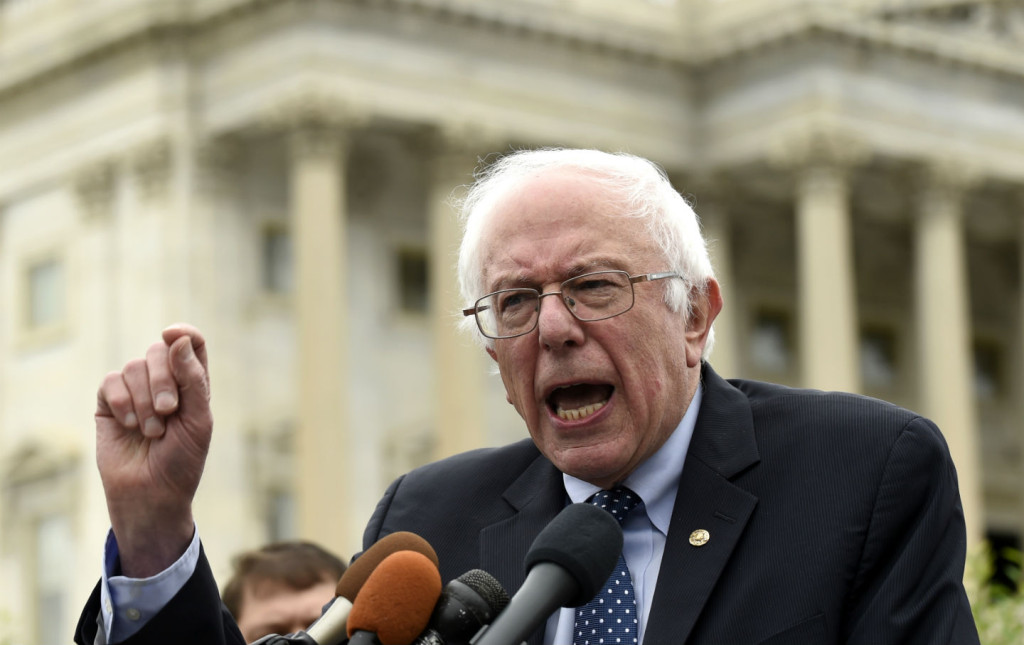
Once a democratic socialist, always a democratic socialist. Once a scold of big money in politics, still a scold. No one can accuse Bernie Sanders of flip-flopping during his four decades in public life. Rock steady, he’s inhabited the same ideological corner from where he now challenges Hillary Rodham Clinton in an improbable quest for the 2016 Democratic presidential nomination. Here he is in 1974, as the 32-year-old candidate for U.S. Senate of a fledgling leftist party in Vermont called Liberty Union: “A handful of banks and billionaires control the economic and political life of America. … America is becoming less and less of a democracy and more and more of an oligarchy.” And now, in an Associated Press interview: “This is a rigged economy, which works for the rich and the powerful, and is not working for ordinary Americans. … You know this country just does not belong to a handful of billionaires.” Some see him as a broken record, others as a person who has been telling the truth all along and just waiting for enough people to listen. “The fascinating thing about Bernie right now is that the agenda has caught up with Bernie,” said Garrison Nelson, a University of Vermont political science professor and longtime Sanders watcher. During Sanders’ near decade as mayor of Burlington in the 1980s, during his eight terms holding Vermont’s lone House seat and during his near decade in the Senate, the message has stayed the same: The rich are absconding with an immorally large part of the country’s wealth, and ordinary people have been getting the short end of the stick. Clinton has gone from opposing same-sex marriage rights to supporting them. Howard Dean, the last Vermont presidential candidate, was a centrist governor who became a liberal representing the “Democratic wing of the Democratic Party,” when he saw the left flank open in the 2004 primary campaign. Sanders, now 73, favored gay marriage rights before it became fashionable in Democratic circles. He voted against the Defense of Marriage Act in the mid-1990s signed by Clinton’s husband, President Bill Clinton. Early in her primary campaign, Clinton has spoken about the gap between the rich and the middle class, in an appeal to the party’s liberal wing. The Republican contenders, too, are taking up the problem of income inequality, although with much different solutions in mind than the Democrats. Steady-as-he-goes Sanders has been at it for decades. He’s admired Canada’s single-payer health care system since way back, talking up “nationalized health care” during his unsuccessful run for Congress in 1988. When Republicans charge that Democrats would bring European-style socialism to the U.S., Sanders says bring it on. “I can hear the Republican attack ad right now: ‘He wants America to look more like Scandinavia,’” George Stephanopoulos said while interviewing Sanders on ABC’s This Week. Sanders replied, “That’s right. That’s right. And what’s wrong with that? What’s wrong when you have more income and wealth equality? What’s wrong when they have a stronger middle class in many ways than we do, a higher minimum wage than we do, and they’re stronger on the environment?” If he’s undergone any transformation, it’s in his political affiliations. He long ago dropped the Liberty Union banner and has run as an Independent in his successful elections in Vermont. He says he remains one “in my heart,” but has caucused with Democrats in Congress. He chose to go for the Democratic nomination and, if he loses the party primaries, says he won’t run for president as an Independent. In an unsuccessful 1986 race for governor as an Independent, Sanders said, “It is time to stop the tweedledee, tweedledum politics of the Republican and Democratic parties.” This time, he’s trying to shake one of the tweedles up from the inside. Republished with permission of The Associated Press.


